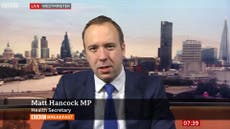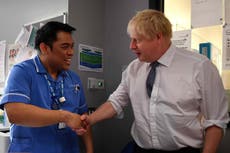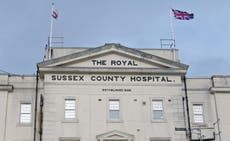As someone who works closely with the NHS, it’s clear Boris Johnson is setting us up to fail
The insufficient funding the prime minister has promised the health service makes clear that he has not reckoned with the mammoth task facing it

We’ve had a stark reminder over six weeks that in many ways we’re living through a time of fantasy politics, with policies and promises designed to appeal to voters rather than deal with reality.
The election is now over and we have a new Conservative administration with a substantial majority. One of its first tasks has been to draft today’s Queen’s Speech. At this point, reality must be starting to kick in. What is striking – and welcome – is the emphasis the prime minister continues to place on the NHS. Speaking the day after his victory, Boris Johnson said: “I have heard it loud and clear from every corner of the country – that the overwhelming priority of the British people now is that we should focus above all on the NHS.”
But what will that mean in practice?
For the NHS, the sheer scale of the task at hand is overwhelming. The best illustration of this is the health service’s recent performance figures. The restrictions of the pre-election period have meant these had not been published for some time, but figures released last Friday showed that the performance of hospitals and urgent and emergency care has reached its lowest point in the 10 years since we started monitoring standards. And we know the pressures are just as great in community and mental health services, although they are not yet measured in the same way.
Here’s what some of the data said: in November, only 71.3 per cent of patients at major A&E departments were seen within the four-hour waiting time target – the lowest on record. Bed occupancy, at 94.9 per cent, was much higher than recommended levels. The number of ambulance arrivals over that week breached 100,00 for only the second time ever.
You get the picture.
Although quality of care once you’re in the system has held up remarkably well, timely access to treatment in the NHS has been slipping for years, despite frontline staff working harder than ever – so hard, in fact, that they’re in danger of burning out. Demand has been steadily outstripping supply; gaps in the workforce have widened substantially; our assets have deteriorated; and financial investment has been lower in the past decade than at any point in the NHS’s 70-year history.
With a big majority the prime minister has the opportunity to be bold. We need that.
The legislation on the NHS expected in today’s Queen’s Speech will help. But, in reality, the boldest move by an emboldened prime minister could be to right some wrongs and tackle the issues that stand in the way of transforming our health and care system. These include an answer to the social care crisis, with a properly funded adult social care system that meets the needs of older and vulnerable people; a reversal of cuts to public health spending and investing in council prevention services; and a move away from focusing on hospitals towards investment in services such as mental health, primary care and community services.
The next bold move by Boris Johnson would be an open and honest recognition of the scale of the task facing the NHS.
We’re setting up hard-working health service staff to fail if we pretend that taking NHS funding back to below its historic long-term average is going to enable us to provide the service to keep up with rising demand, close the gap that’s opened up over the last decade and invest in the transformation it desperately needs. We need the government to be honest about what the extra funding, welcome as it is, can realistically buy. We need realism on how long it will take to get NHS performance back to where it ought to be and how long it will take to transform the way care is delivered to meet future needs.
So amid all the pomp and ceremony, today’s Queen’s Speech is all about politics. Of course, it’s the politics of a programme from a new administration. But, critically for the NHS, it should also be the politics of reality.
Saffron Cordery is the deputy chief executive of NHS Providers





Join our commenting forum
Join thought-provoking conversations, follow other Independent readers and see their replies